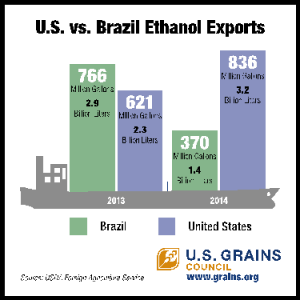Worldwide demand increases for ethanol, paired with new government and taxation policies put into effect every year, alter ethanol trade on all levels.
Since the Renewable Fuel Standard (RFS) went into effect in 2005, U.S. ethanol production has soared. But historically-high corn prices during that time period and underinvestment in infrastructure capable of distributing gasoline blends containing more than 10 percent ethanol have constrained U.S. ethanol consumption. In recent years, the combination of lower corn prices and increased ethanol production has had U.S. ethanol producers actively seeking export markets.
In 2015, U.S. farmers had another record corn crop and the U.S. ethanol industry continued to grow, maintaining its position as the world’s leading ethanol exporter.
The U.S. Department of Agriculture’s (USDA’s) Economic Research Service (ERS) data for the 2014/2015 marketing year indicates the United States exported nearly 872 million gallons (3.3 billion liters) of ethanol and surpassed Brazil for the third time since 2011 as the world’s leading ethanol exporter.
Brazil’s Decreased Ethanol Exports
Brazilian ethanol is made from sugar cane feedstock, making sugar prices a key factor in their ethanol industry. A lower sugar cane harvest and a decreased import demand from the United States account for the reduction in Brazilian exports. According to the most recent analysis by USDA’s Foreign Agricultural Service, Brazilian ethanol exports decreased by half from 766 million gallons (2.9 billion liters) in 2013 to 493 million gallons (1.9 billion liters) in 2015.
Looking to the future, the Brazilian government recently raised their ethanol fuel blend mandate from 25 to 27.5 percent, which should increase their domestic use even more and decrease the amount of Brazilian ethanol available for export.
Although the quantity of available ethanol for export has decreased, Brazilian sugar cane ethanol will continue to be exported to the U.S. market, according to the International Trade Administration’s 2015 Renewable Fuels Top Markets report. Sugar cane ethanol qualifies as an advanced biofuel under the EPA’s RFS regulations, allowing U.S. blenders to meet their specific blending requirements for advanced biofuels.


